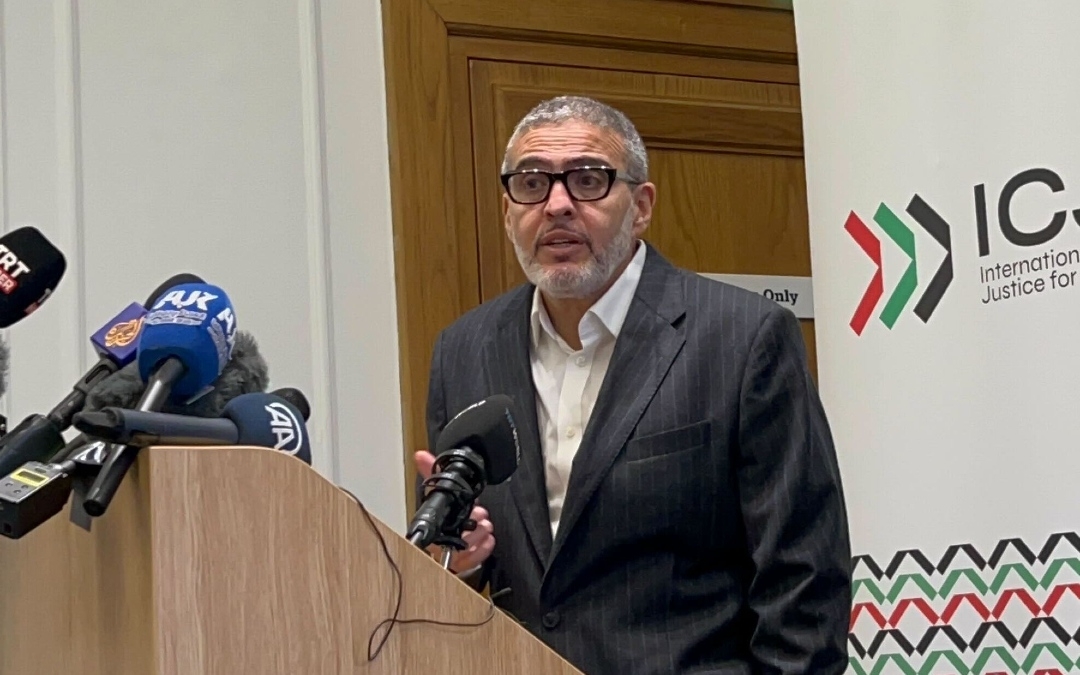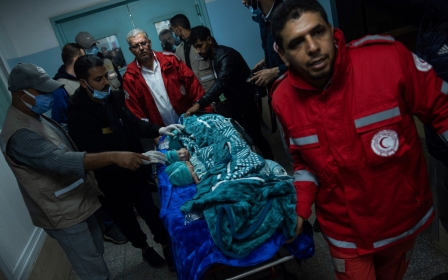Israel-Palestine war: British surgeon accuses Israel of using white phosphorus in Gaza

A British-Palestinian surgeon who has just returned to the UK after weeks working in two of Gaza's main hospitals has accused Israel of targeting civilians fleeing its bombardment of the besieged territory with white phosphorus and snipers.
Ghassan Abu-Sittah, an expert in plastic surgery and war zone medicine whose social media posts documented the deteriorating conditions facing medical staff and patients inside hospitals, said the weeks'-long assault had shown that Israel had targeted mainly children in the besieged territory.
Speaking to Middle East Eye in London, Abu-Sittah said the “sheer colossal number of 7 to 8,000 wounded, and around 7,000 children killed in only 40 days is just breathtaking".
“The wounds sustained by many of my patients showed markings that are similar to the ones inflicted by the use of white phosphorus and other incendiary weaponry,” said Abu-Sittah.
“Following Israel’s ground invasion, we began to, for the first time since I was in Gaza, see patients with high-velocity sniper injuries used to target civilians that are visiting or trying to visit the hospital.”
New MEE newsletter: Jerusalem Dispatch
Sign up to get the latest insights and analysis on Israel-Palestine, alongside Turkey Unpacked and other MEE newsletters
Earlier this month, Amnesty International and Human Rights Watch accused Israel of using white phosphorus in its military operations in Gaza and southern Lebanon.
The Israeli military denied it used white phosphorus and said the claims "made against the IDF regarding the use of white phosphorus in Gaza is unequivocally false".
Having operated in multiple war zones during his 30-year career, including Yemen and Syria, Abu-Sittah described the situation in Gaza as “desperate” and said doctors like him were forced to use “washing-up liquid” and “vinegar” to disinfect wounds and help patients as hospitals became overwhelmed.
Dr @GhassanAbuSitt1 who returned from Gaza to the UK speaks to MEE describing a “desperate” situation in the besieged strip.
— Middle East Eye (@MiddleEastEye) November 27, 2023
Abu Sittah teared up when recalling some of the child patients he operated on pic.twitter.com/SYQRKHJTy8
“Eventually, everything was running out. Initially, we replaced the antiseptic solution with washing-up liquid and vinegar,” he said.
“Then it ended up being morphine and having to do procedures without any anaesthetic.
“The situation was medieval-like, our patients were in agony.”
The International Centre of Justice for Palestinians (ICJP), which is collecting evidence as part of its efforts to prepare a war crimes case against Israel, said Abu-Sittah would be giving testimony to the London Metropolitan Police’s war crimes unit.
Follow Middle East Eye's live coverage for the latest on the Israel-Palestine war
Tayyab Ali, who runs the ICJP, said the centre is taking eyewitness testimonies from investigators inside Gaza and compiling lists of alleged violations perpetrated by Israel during its war on the besieged territory.
The legal group added that it will also be collating evidence against British citizens who have gone to Israel to fight in Gaza.
During a press conference in London with Abu-Sittah, the ICJP showed journalists a compilation of footage of his time in Gaza from various hospitals in the besieged enclave.
The footage included pictures of children who had lost limbs, and wounds sustained by Palestinians that appeared consistent with the use of white phosphorus.
'Every time you drove past a building, you could smell death and decay'
- Ghassan Abu-Sittah, surgeon
Having previously worked in Gaza during Israel’s 2008 assault on the territory, Abu-Sittah said that many of his patients exhibited similar injuries to those sustained from white phosphorus munitions in the earlier conflict.
Abu-Sittah, who worked at both al-Shifa and al-Ahli Hospitals, noted that Gaza’s medical infrastructure had been targeted repeatedly by Israeli forces during its bombardment of the territory.
“We saw the Israelis target solar panels on top of hospitals, buildings and even patients,” he said.
“Every time you drove past a building, you could smell death and decay.
“If we live in a world where it’s okay to do this, then that world is a dangerous place.”
When asked about his time in Gaza, Abu-Sittah said he would never forget the faces of those he had treated. He recalled one young girl whose mother, a doctor at al-Shifa Hospital, and sister had been killed, and was being cared for in the hospital by her mother's colleagues.
"She had horrendous facial injuries, but she had her braids and her hair band and her nail polish."
Another patient, a man with third-degree facial burns and burns to his arms and legs, had died after two rounds of surgery. And another patient he had treated after his father had pushed him for five hours in a wheelchair to see him.
"All of them stick in your mind," he said.
This article is available in French on Middle East Eye French edition.
Middle East Eye delivers independent and unrivalled coverage and analysis of the Middle East, North Africa and beyond. To learn more about republishing this content and the associated fees, please fill out this form. More about MEE can be found here.




